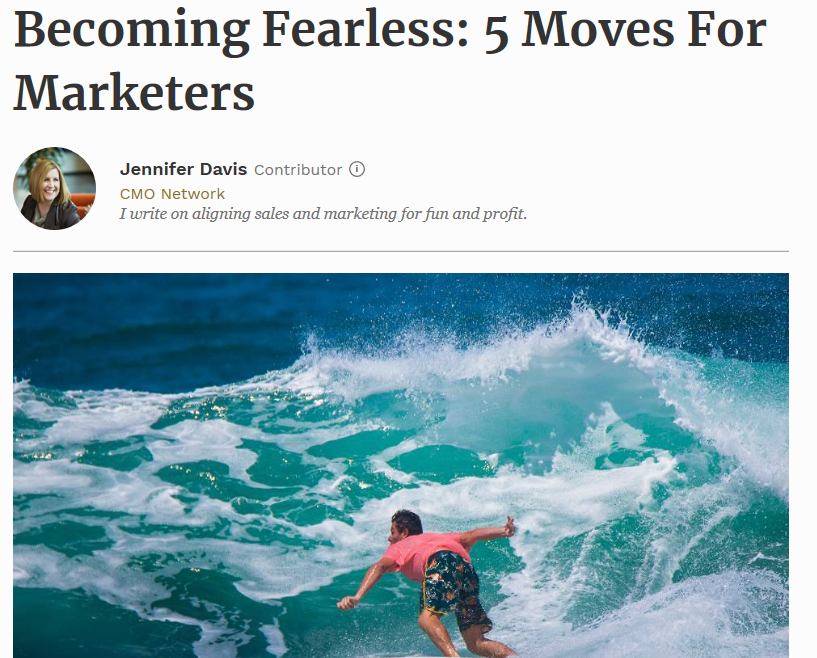As a marketer, we are asked to make smart investments without all the information. The ever-increasing pace of industry, competitive pressures and rising investor and customer expectations are having their effect. To remain at the top of our game, we must demonstrate a bias for action and the ability to quickly pivot and learn. We are often asked to be change agents, which implies some conflict with internal and external stakeholders, or even our own bosses. We want to make smart decisions. We want to make a difference. We want to be confident and gain the confidence of others. How do we accomplish that? I believe the answer is in being fearless.
The word “fearless,” is often used to synonymously with fear-free. “He ran fearlessly into the burning building to save the child,” the newspaper will report of the local hero. “She has a fearless brush stroke,” they will tell of an artist’s boldness. “He fearlessly changed the business model from traditional transactions to a pay-as-you-go service business,” magazines will report. “Her fearless investments in the new market segment put her ahead of her competition,” followers will admire. "We fearlessly moved our business to the cloud, leading our industry in digital transformation," the annual report will boast. But any of these people will tell you that they have doubts. They were not guaranteed success. There is not a sub-species with superhuman abilities not to feel anxiety (although, in fairness, sometimes when I see the professional snowboarders flipping through the half-pipe or surfers attacking a crashing wave, I might be convinced otherwise). But for the rest of us mere mortals, it isn't about being fear-free, but rather they are overcoming their fears.
What does it mean to be fearless in your business and how can fearlessness be cultivated?
1. It is a mindset change
The answer might be hidden in the word itself. The term “less” is a relative word. It implies that it is less when compared to something else. I am sure you can sting your eyes with “tearless” shampoo, but it is meant to imply a relative safety to other products on the market. We use words like seamless, matchless, baseless, careless, effortless, heartless, motionless, priceless, and thankless as if they are absolutes, but they are really descriptions of relation. You can be seemingly tireless, but still get tired. So, being fearless is to fear less than you did before when faced with uncertainty. That is a choice that you make each day. In marketing, we may shift investment from traditional advertising channels or events to new digital initiatives or approaches. We may change our go-to-market structures, introduce new solutions, target new markets, go after new types of customers. All of these can be seen as fearless moves in hindsight, but if we live in the moment and in the data fearing less, we can improve our chances of success, even when we face internal opposition or hesitancy, without taking on unnecessary risk.
2. It requires practice
Extreme sports athletes seem fearless, but they train for years, risking life and limb, to build up the skills and stamina to wow us in prime time. They overcame their fear one run at a time and practice managing their mind along with their bodies. Entrepreneurs are known for their fearlessness, but that was also trained with small bets and experimentation throughout their lives.
In my experience, confidence is not the opposite of fear: it is action. Fear can be paralyzing, especially when combined with a vivid imagination, but the fearless face it down, give it a name, and move forward. Not recklessly, but with calculated intention, identifying and mitigating risks. To be fearless is just to strive to fear less than you did the day before and you do that with action. Before long, you are accomplishing things never before possible and bringing others along with you on the journey.
3. It builds confidence
I recently heard Beau Lotto, the neuroscientist whose TED talk has generated over 5 million views, say that “courage is more important than confidence.” The best leaders are right a lot of the time and are worth betting on, but more importantly, they have a bias for action. You only have confidence after someone had courage and proved it could be done. Hopefully, of course, that someone is you and you can reap the early mover advantages. Others see the success and what is possible and may live a bit more fearlessly as well.
4. It changes your priorities
You can be 100% correct about things that happened in the past (like last week's lottery numbers), but since we live our lives looking forward, we do not have that luxury. Quite the opposite. In today’s changing landscape, the tactics and strategies that worked in the past might as well be guaranteed not to work in the future. Be skeptical of anyone whose marketing plan, marketing metrics and Key Performance Indicators (KPIs) are not changing over time. That is something to be truly afraid of. To fear less means to learn more and that is bound to change what you are measuring and where you are aiming your attention and resources.
5. It changes the way you work on a daily basis
Sometimes as leaders we see fearlessness demonstrated in bold business strategies or big M&A investments, but not all fearlessness happens in the boardroom at scale. It is seen in the conversations we have that are awkward or difficult. The coaching conversations with a struggling employee. The negotiations with stakeholders for input or support. The fierce disagreements that result in a strong commitment to the decisions, whether they aligned with your ideal or not. This is where the strength of our backbones are tested. Where our fearlessness and our commitment to strategy is demonstrated. This is where we build our confidence, reveal our new priorities and practice our new mindset.
This article was originally published on Forbes.com.

